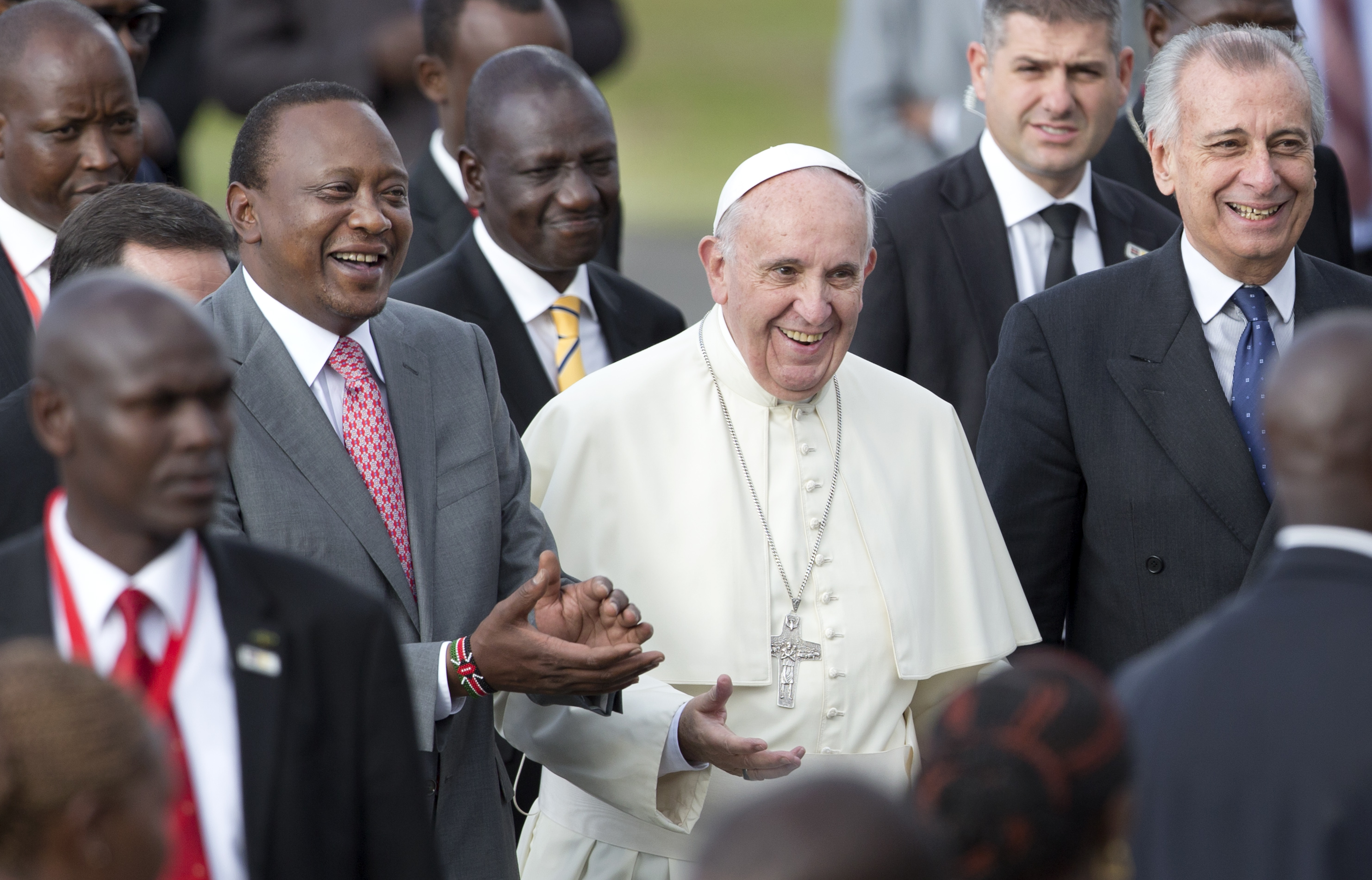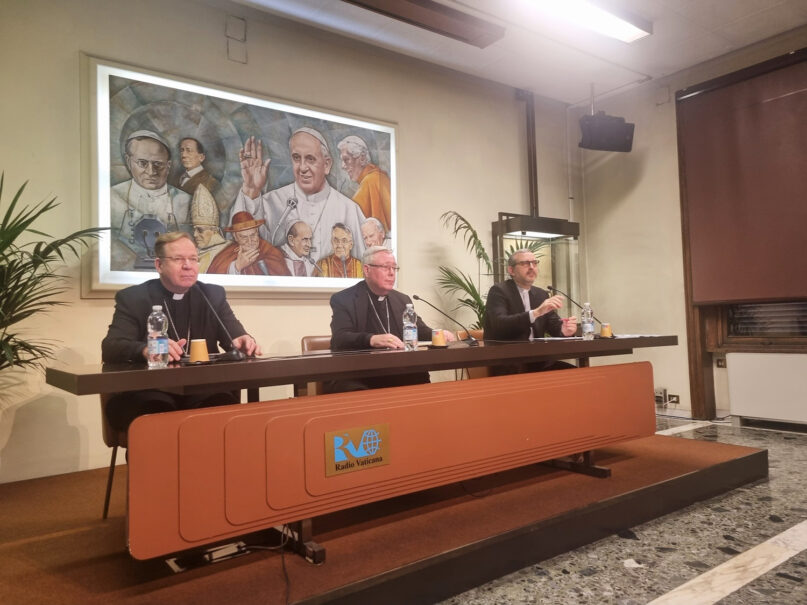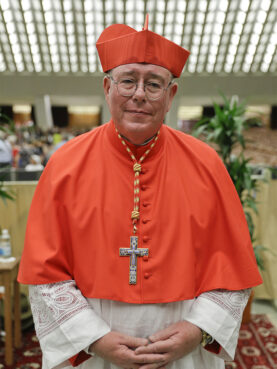VATICAN CITY (RNS) — More than a year into Pope Francis’ Synod on Synodality, the full scope of this massive, unprecedented consultation of Catholics around the world is just now beginning to come into focus, even for its organizers.
“I find this a very interesting phase of church history,” said Cardinal Jean-Claude Hollerich, archbishop of Luxembourg and the general rapporteur of the synod, at a press conference Wednesday (Dec. 14) as he introduced the continental phase of the synod. In the next months, seven assemblies of bishops (in the six traditional continents, plus the Middle East) will consider a document compiled from listening sessions held in thousands of parishes and dioceses.
“The pope wants us to truly live the Second Vatican Council and Lumen Gentium,” he said, referring to the yearslong meeting of bishops in the 1960s that attempted to reconcile the church with the demands of post-World War II modernity and the new constitution that emerged from it.
Lumen Gentium (Light of the Nations) outlined on one hand the need to reconsider the role of the bishops, and on the other hand called for all baptized Catholics to take a share in determining the future of the church, Hollerich said.
Francis’ synod, on the theme For a Synodal Church: Communion, Participation and Mission, is intended to build on the promises of Vatican II, the cardinal explained, especially concerning the role of lay people in the church, which “was not taken up in synodality at the time.”
The synod, launched in 2021 with the pope’s request for discussions among Catholics around the globe about challenges facing the church, will conclude at the Vatican in two installments in October 2023 and 2024. The conversations that took place over the past year were collected by national bishops’ conferences, who in turn sent summaries to the Vatican.
In October this year, a group of Vatican theologians, clergy, religious and lay individuals met in the small town of Frascati near Rome to create a single document from the national summaries to guide further discussions. The continental assemblies will send the Vatican new summaries, which will supply a new document as a guide for next fall’s meeting of bishops in Rome.
The circular decision-making is actually an effort to include lay people’s involvement in the church, Hollerich said, which has become increasingly infected by clericalism, a sentiment shared by clergy and lay Catholics alike that priests occupy a higher status in the church.
The cardinal said that in his previous synods, on family, youth and on the particular problems of the Amazon region, Francis “wanted to take the people of God up in the process,” but that in those meetings only “timid attempts” were made. “For this synod it’s even more!” he said.
The European continental assembly is scheduled to meet in Prague from Feb. 5 to 12. In the first five days, 200 people, including 156 delegates from the 39 European bishops’ conferences, will attend. Each national delegation will be composed of the president of the bishops’ conference and three delegates, chosen to represent the diversity of the faithful. The Council of the Bishops’ Conferences of Europe has invited 44 representatives of Catholic Charities and other religious organizations. “Fraternal” delegates from other religious denominations have also been invited to attend.
Another 390 participants, 10 from each national conference, will participate online, and communities of contemplative orders have been invited to accompany the proceedings with prayer. Online and in-person participants will divide into discussion groups of 15 that will offer their reflections.
“All the bishops’ conferences have been urged to go as wide as possible in their selection,” said Archbishop Gintaras Grušas of Vilnius, president of the CCEE, at the press conference.
The last two days of the assembly will be attended exclusively by the representatives of the bishops’ conferences.
Hollerich said the discussions will be moved by God. “Who is the person making the decisions at the synod? Is it the pope? Is it Cardinal Grech? Is it the relator general?” he asked. “My answer was quite simple, and I hope it is true: It’s the Holy Spirit.”
The synod isn’t designed to overthrow the episcopate, the cardinal said, pointing out that the final summit at the Vatican will likely mostly comprise bishops. “The bishops and the Holy Father, in the end, will have to bring discernment to accomplishment. But the matter for discernment is given by the people of God,” he added.
But the role of bishops’ conferences might be reconsidered as synod participants search for new ways of reckoning with the issues facing the church, Hollerich said. “We noticed that there is a certain narrowness in just having a certain national bishops’ conference,” he explained. “Sometimes you can find solutions easier if you speak with other people who have a different point of view, and there is a danger of falling into national churches” that champion local causes over the will of the broader church.
Recently, the United States and German bishops’ conferences have found themselves at odds with the Vatican and Francis.

Pope Francis, center, is accompanied by Kenya President Uhuru Kenyatta, left, and Deputy President William Ruto, center-left, on his arrival at the airport in Nairobi, Kenya, Wednesday, Nov. 25, 2015. Pope Francis left Wednesday for his first-ever visit to the continent, a whirlwind pilgrimage to Kenya, Uganda and the Central African Republic, bringing a message of peace and reconciliation to an Africa torn by extremist violence. (AP Photo/Ben Curtis)
As African countries prepare for their continental assembly, the changing relationship between clergy and lay faithful is already apparent. “For me, the way the people felt free to express their concerns before the bishops was a sign of change in our approach to things,” the Rev. Dieu-Donne Kofi, the synod communications coordinator for the Symposium of Episcopal Conferences of Africa and Madagascar, told Religion News Service on Thursday.
“People felt like they could speak in front of their shepherds. They were happy their shepherds were willing to listen to them and shared in their concerns,” he said.
The African continental assembly takes place in three phases. Twenty-five lay and religious experts and theologians met in Accra, Ghana, Dec. 6-9, for a working session. “The church was represented at all levels,” Kofi said, adding that a Vatican “consultor” for the synod, the Rev. Giacomo Costa, helped with organizing the meetings.
The results of these sessions were taken back to local dioceses for further discussion. Their responses will be resubmitted at the next working sessions in January 2023 in Nairobi, Kenya. The final continental assembly will take place in Addis Ababa, Ethiopia, in March.
Kofi, who wrote the summary for the diocesan phase in his native Ghana and attended the first working session in December, said that some who met already feel that “the process will bring some renewal of the church.” He encouraged those who might feel “alienated or left behind” in the process not to “wait to be called upon before you come onboard.”
Pointing to the cultural differences and conflicts that tear at the church in the African continent, Kofi said the synod has posed the question of how to leverage that diversity. The sentiment echoed that of European Catholics currently tackling ideological polarization over the Russian-Ukrainian war.
Hollerich is looking forward to finding common solutions to the experiences of all the continental groups. “I hope that the outcome won’t be what one group has said or what another group has said — that would be a failure — but that something new will emerge from the tensions we are facing.”
“There are tensions, of course there are tensions,” Hollerich said, “but we are the church together.”






